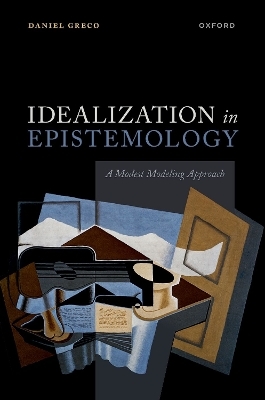
Idealization in Epistemology
A Modest Modeling Approach
Seiten
2023
Oxford University Press (Verlag)
978-0-19-886055-6 (ISBN)
Oxford University Press (Verlag)
978-0-19-886055-6 (ISBN)
Daniel Greco argues that the landscape of epistemology looks quite different when viewed through the lens of idealization and model-building. We should accept that theorizing in epistemological terms is inescapably idealized, and that we can know a wide variety of facts with certainty despite our cognitive limitations.
It's standard in epistemology to approach questions about knowledge and rational belief using idealized, simplified models. But while the practice of constructing idealized models in epistemology is old, metaepistemological reflection on that practice is not. Greco argues that the fact that epistemologists build idealized models isn't merely a metaepistemological observation that can leave first-order epistemological debates untouched. Rather, once we view epistemology through the lens of idealization and model-building, the landscape looks quite different.
Constructing idealized models is likely the best epistemologists can do. Once one starts using epistemological categories like belief, knowledge, and confidence, the realm of idealization and model-building is entered. We can object to a model of knowledge by pointing to a better model, but in the absence of a better model, the fact that a framework for epistemologizing theorizing involves simplifications, approximations, and other inaccuracies-the fact of its status as an idealized model-is not in itself objectionable.
Once we accept that theorizing in epistemological terms is inescapably idealized, a number of intriguing possibilities open up. Greco defends a package of epistemological views that might otherwise have looked indefensibly dismissive of our cognitive limitations-a package according to which we know a wide variety of facts with certainty, including what our evidence is, what we know and don't know, and what follows from our knowledge.
It's standard in epistemology to approach questions about knowledge and rational belief using idealized, simplified models. But while the practice of constructing idealized models in epistemology is old, metaepistemological reflection on that practice is not. Greco argues that the fact that epistemologists build idealized models isn't merely a metaepistemological observation that can leave first-order epistemological debates untouched. Rather, once we view epistemology through the lens of idealization and model-building, the landscape looks quite different.
Constructing idealized models is likely the best epistemologists can do. Once one starts using epistemological categories like belief, knowledge, and confidence, the realm of idealization and model-building is entered. We can object to a model of knowledge by pointing to a better model, but in the absence of a better model, the fact that a framework for epistemologizing theorizing involves simplifications, approximations, and other inaccuracies-the fact of its status as an idealized model-is not in itself objectionable.
Once we accept that theorizing in epistemological terms is inescapably idealized, a number of intriguing possibilities open up. Greco defends a package of epistemological views that might otherwise have looked indefensibly dismissive of our cognitive limitations-a package according to which we know a wide variety of facts with certainty, including what our evidence is, what we know and don't know, and what follows from our knowledge.
Daniel Greco completed his AB in philosophy at Princeton University, his MPhil in Philosophy at Cambridge University, and his PhD in philosophy at the Massachusetts Institute of Technology. He was a Bersoff Faculty Fellow at NYU and since then he has taught at Yale University. His research is primarily in epistemology, but includes points of overlap with philosophy of science, philosophy of mind, and metaethics. He has won both the Karl Popper Prize and the Young Epistemologist Prize.
Acknowledgments
Introduction
1: Idealization and Modeling
2: Modest Modeling
3: Modeling With Possible Worlds
4: Certainty and Undercutting
5: Belief and Credence
6: Inter-Level Coherence
7: Common Knowledge
8: Ideal and Non-Ideal Epistemology
Bibliography
| Erscheinungsdatum | 08.08.2023 |
|---|---|
| Verlagsort | Oxford |
| Sprache | englisch |
| Maße | 162 x 240 mm |
| Gewicht | 478 g |
| Themenwelt | Geisteswissenschaften ► Philosophie ► Erkenntnistheorie / Wissenschaftstheorie |
| Naturwissenschaften | |
| ISBN-10 | 0-19-886055-2 / 0198860552 |
| ISBN-13 | 978-0-19-886055-6 / 9780198860556 |
| Zustand | Neuware |
| Informationen gemäß Produktsicherheitsverordnung (GPSR) | |
| Haben Sie eine Frage zum Produkt? |
Mehr entdecken
aus dem Bereich
aus dem Bereich
die Grundlegung der modernen Philosophie
Buch | Softcover (2023)
C.H.Beck (Verlag)
CHF 25,20
Buch | Softcover (2023)
Reclam, Philipp (Verlag)
CHF 9,80

![Was heißt Denken?. Vorlesung Wintersemester 1951/52. [Was bedeutet das alles?] - Martin Heidegger](/media/113619842)
